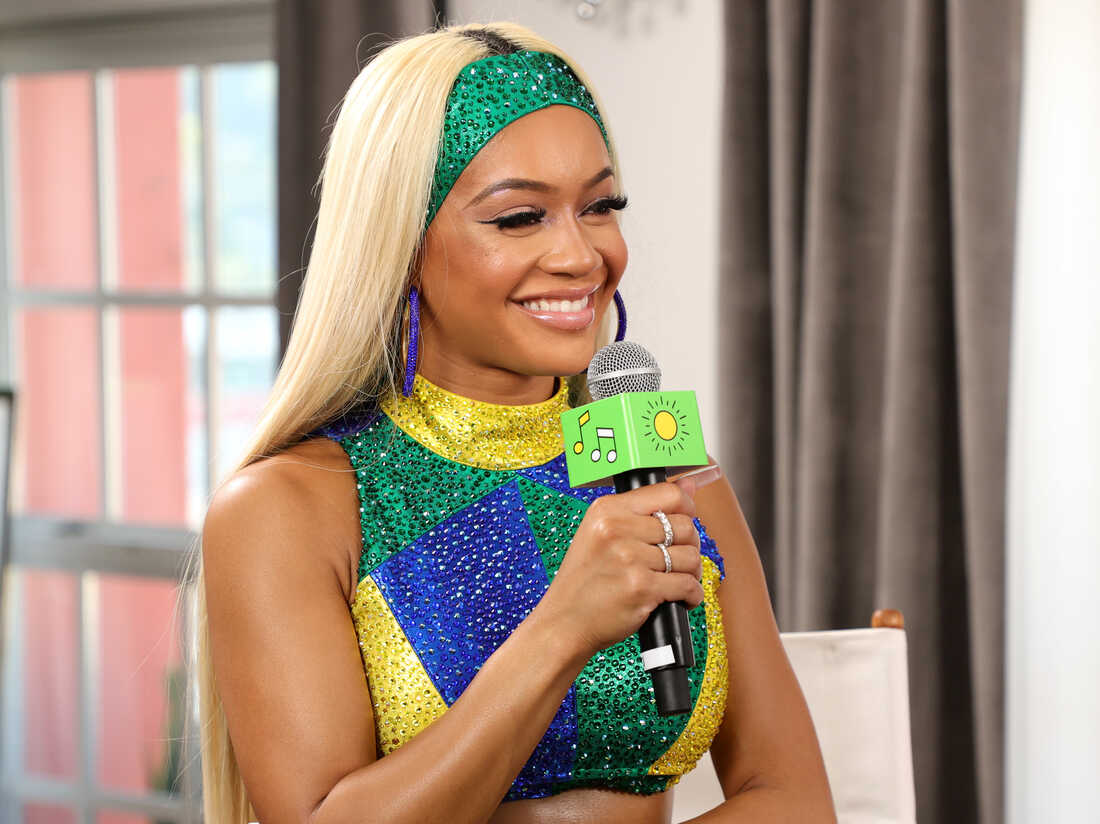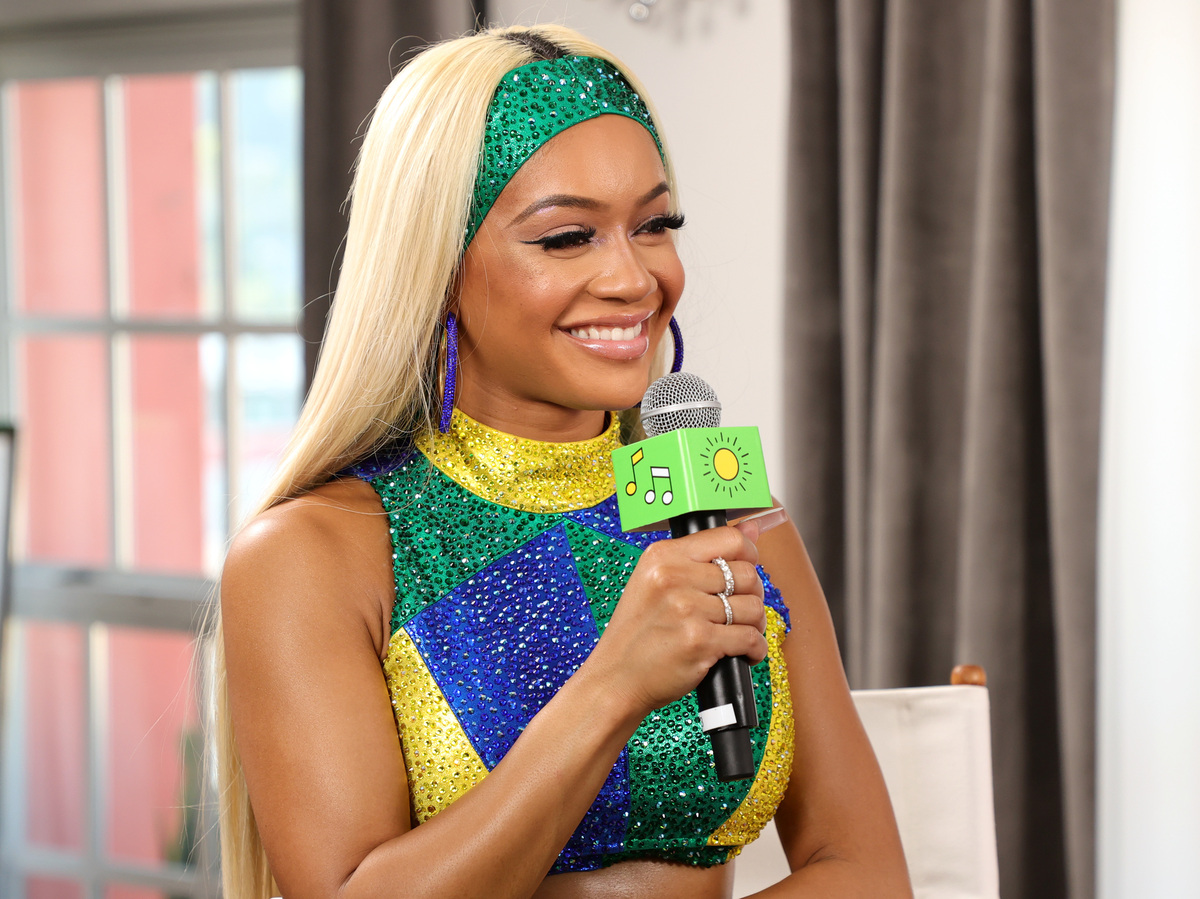
Saweetie speaks at Sprite’s Live from the Label Virtual Concert Series in Los Angeles. The best-selling rapper recently became the latest celebrity to have her own branded meal at McDonald’s.
Rich Fury/Getty Images for Sprite
hide caption
toggle caption
Rich Fury/Getty Images for Sprite

Saweetie speaks at Sprite’s Live from the Label Virtual Concert Series in Los Angeles. The best-selling rapper recently became the latest celebrity to have her own branded meal at McDonald’s.
Rich Fury/Getty Images for Sprite
Watch out folks: This summer may just be getting a little bit icy.
Multi-platinum rapper Saweetie, who rose to fame with her hit single “Icy Girl,” is teaming up with McDonald’s to bring a little twist to her favorite menu order for her fans. Starting this week, customers across the United States can order “The Saweetie Meal,” featuring a few of the fast-food chain’s signature items — and a “Saweetie ‘N Sour” sauce.
“McDonald’s and I run deep — from growing up back in Hayward, California, all through my college days — so I had to bring my icy gang in on my all-time favorites,” Saweetie, whose real name is Diamonté Harper, said in a news release.
The company’s partnership with the rapper is just the latest example of major brands, from Adidas to Cadillac, reaching out to diverse consumers, as the nation continues to recover from the racial turmoil following George Floyd’s murder last summer.
Saweetie’s promotion joins a variety of diverse artists
Saweetie marks the first female musician, and the first African-American female musician, to have a celebrity menu collaboration with McDonald’s since the company kicked off its Famous Orders program in 2020.
Previous limited-time meals introduced by the company featured a wide variety of celebrities, including last September’s meal with rapper Travis Scott, last October’s meal with reggaeton artist J Balvin and, most recently, this summer’s meal with the South Korean pop band BTS.
The celebrity-inspired meals have been a hit for the fast-food chain. McDonald’s President and CEO Chris Kempczinski hinted this month that more celebrity meals may be coming, according to USA Today.
In May, McDonald’s announced new investments in diverse-owned media content for the company in an effort to further reflect its diverse customers, workers and communities in its marketing.
Over the next four years, the company says it will allocate advertising dollars to diverse-owned media companies, production houses and content creators. With Black-owned properties specifically, McDonald’s says its diverse-owned media partners will increase from 2% to 5% of the company’s national advertising spending over time.
Representation of diversity is on the rise among major brands
In the past year, many brands and companies have become noticeably more inclusive, featuring more Black and other minorities in their ads and marketing materials as a way to take a stand against racism.
Following George Floyd’s murder last May, companies across the globe began issuing various calls to action — including more diversity in advertising, increased spending on diverse companies and investing a greater amount of money in minority-owned media companies — in an effort to connect with Black and brown consumers.
“With the uprising and the advocacy and the demands after the murder of George Floyd, really there’s been a spotlight shining on the importance of highlighting and making space for Black people, specifically Black women,” said Alfredo Del Cid, head of learning and development at Collective, a diversity, equity and inclusion consulting firm.
A number of major brands have struck deals with major Black celebrities in an effort to maintain and expand their consumers of color.
Earlier this year, Uber Eats partnered with Olympian Simone Biles, featuring the star gymnast in its ads and TV commercials around the time of the Tokyo Olympics.
Cadillac partnered with award-winning actress Regina King, naming her a brand ambassador and the star for its campaign for the newest line of the Escalade SUV.
And Beyoncé partnered with Adidas to launch her “Ivy Park” clothing collection.
“There’s all of these ways that these partnerships are coming together that influence the consumer — because the consumer is ultimately interested in trust, right?” said Christina Ferraz, founder and head consultant of marketing agency Thirty6five.
“That trust with the brand is what’s going to make them invest in the brand. When they see that that brand is doing what they want,” they said.
In a social media world, brands are being held accountable
So far in 2021, large brands are continuing their commitment to invest more of their budgets in minority-owned companies.
General Motors announced in April significant changes to its model for partnering with diverse-owned and diverse-targeted media — allocating 2% of its ad spending in Black-owned media in 2021, and 4% in 2022, with a goal of reaching 8% by 2025.
And in June, Coca-Cola pledged to double its ad spending with minority-owned media, saying it will be five times higher in 2021 than a year earlier, according to a news release.
Ferraz says that in the social-media era, companies and their reputations with diverse consumers are in increasingly intense spotlight.
“Brands now have to be held accountable in a way that they’ve never been held accountable before,” they said.
Editor’s note: McDonald’s is among NPR’s financial supporters.


